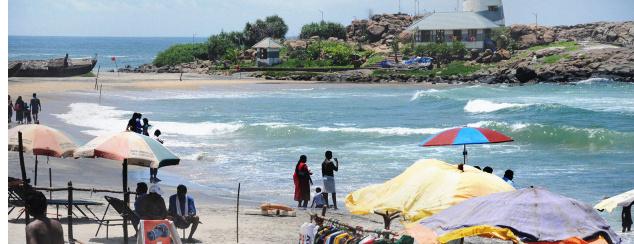Two truck-loads of food waste, 150 sacks of plastic waste collected a day
Another peak tourist season has begun, but a permanent waste management system is yet to be in place in Kovalam.
The beaches and resorts that dot the Light House, Eve’s and Samudra beaches are turning lively with the arrival of vacationers. Yet the destination that fetched the State a spot on the world tourism map is yet to turn environment-friendly.
Littering, ingress of waste that reaches Kovalam through Parvathy Puthanar and Thiruvallom, and the lack of a dumping yard for the waste collected from the hotels and resorts on the beach is the biggest challenge faced by the authorities. The dumping of food waste by tourists is also is an issue.
Attempts to move the garbage to a 50-cent plot owned by Kerala Tourism at Mayakunnu behind the Light House beach is being opposed by hoteliers and local people. A cultural centre has been proposed at the site.

The Zero Waste Kovalam Project, envisaged in association with city-based NGO Thanal in the late 1990s; and the Plastic-free Kovalam Project, under the Kerala Tourism Protection Development Council (KTPDC), and the Association of Tourism Trade Organisation’s India (ATTOI) in 2011 have not succeeded. The setting up biogas plants in 1,500 houses is only half-way through.
Volunteers employed by Eco Preserve, an NGO, has been taking care of the waste disposal for the last one decade. The food waste from the 150 hotels that have enrolled in the project is collected between 11 p.m. and 2 a.m. Plastic waste is collected during daytime.
“As there is no dumping yard, the food waste collected that comes up to two trucks is transported immediately to be disposed of. The plastic collected daily comes to around 150 sacks,” says K. Vijayachandran of the Eco Preserve.
The three beaches are kept clean by eight personnel working round the clock. The road leading from Kovalam junction to the beach is swept every day.
The NGO’s request to hike the daily wages of the 40 employees from Rs.175 to Rs.250 is yet to be heeded. The government is contributing only 50 per cent of the wages and 70 per cent of the recurring expenditure for waste disposal.
On an average, one tonne of bio-degradable waste and half a tonne non-biodegradable waste are generated during the four-month peak season.
